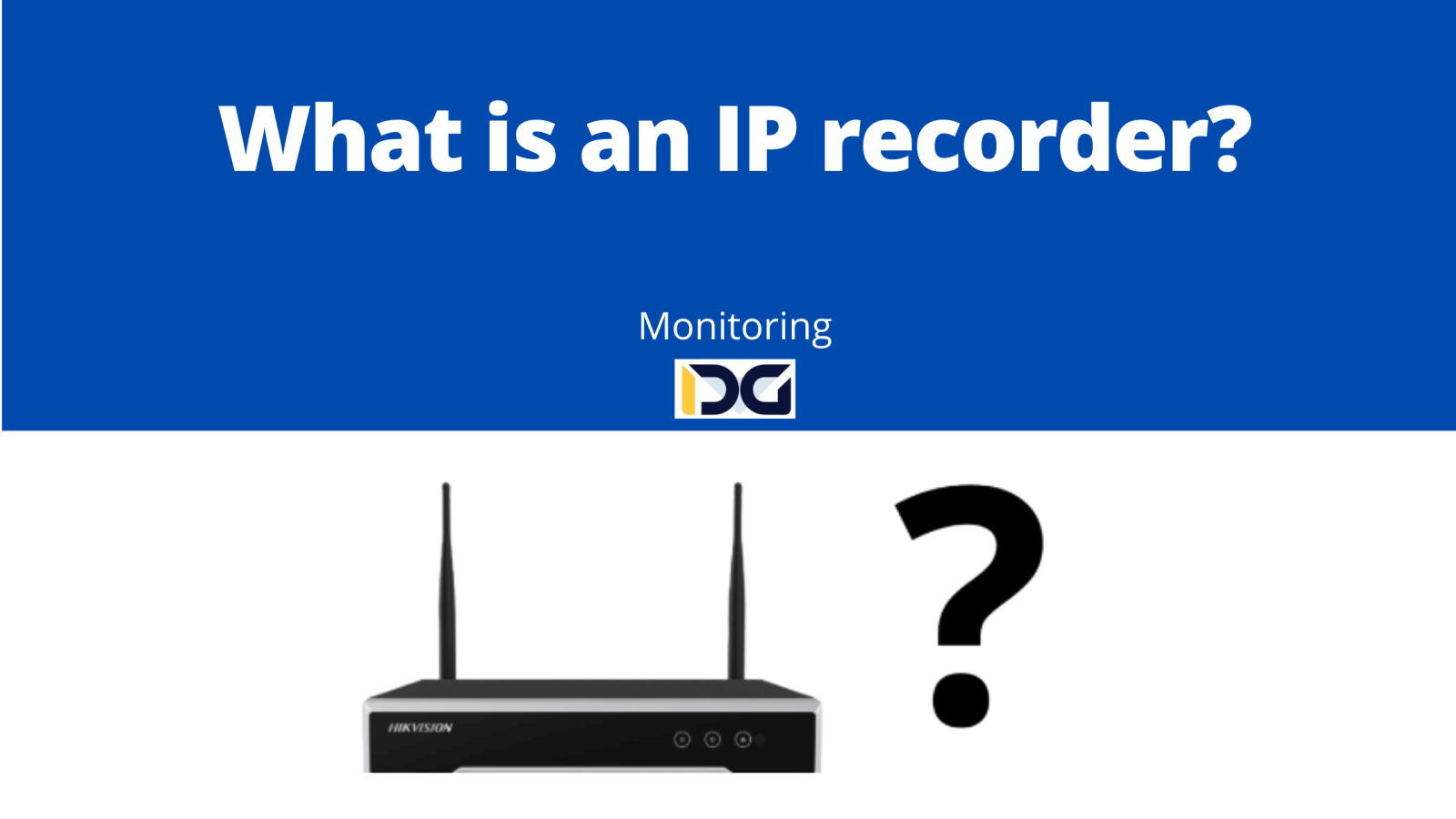
An IP recorder is a device used to record video from IP cameras. The IP recorder is connected to a computer network and is capable of capturing and storing video footage from IP cameras in its internal memory or on external storage devices such as hard drives, network-attached storage (NAS), cloud storage, or SD cards. It may also have additional features such as motion detection, intelligent analytics for people, vehicle, face recognition, line crossing, or intrusion detection. It can also have alarm inputs and control outputs. IP recorders are commonly used for monitoring public areas, warehouses, public utility buildings, and more.
How does an IP recorder work?
An IP recorder works by connecting to a computer network and receiving video streams from IP cameras. Once the video is received, the recorder saves it in its internal memory or on external storage devices. The recorder may also have features such as motion detection, which allows for automatic recording when motion is detected in the camera’s field of view. Additionally, the recorder may have alarm functionality, sending notifications to the user or emergency services in case of predefined events.
An IP recorder can also be connected to the internet cloud, allowing for remote access to recorded footage from anywhere via the network. Users can set recording schedules and select which cameras are active at specific times. All these features enable flexible and efficient management of video recordings from IP cameras.
Open this in UX Builder to add and edit content
What is an IP recorder?
An IP recorder is a device used to record video from IP cameras. It is connected to a computer network and is capable of capturing and storing video footage from IP cameras in its memory. It can be used for various purposes, such as:
Monitoring public places and public utility facilities like shops, warehouses, public buildings, etc. Protecting property and ensuring the safety of individuals in private buildings like homes, offices, etc. Enabling access to recorded footage from IP cameras from any location via the network. Assisting in the recording and archiving of important events such as conferences, sports events, etc. Supporting the investigation process in case of alarming events or crimes being detected.
The IP recorder is often used as a component of a video surveillance system, allowing for continuous or scheduled recording of camera footage and facilitating quick search and playback of recordings when needed.
How does an IP recorder work?
An IP recorder works by connecting to a computer network and receiving video streams from IP cameras. The recorder saves the received video footage in its internal memory or on external storage devices. It may also have additional features such as motion detection, allowing for automatic recording when motion is detected, or alarm triggers that send notifications to the user or emergency services in case of predefined events.
An IP recorder can also be connected to the internet cloud, enabling remote access to recorded footage from anywhere via the network. Users can set recording schedules and choose which cameras are active at specific times. All these features provide flexible and efficient management of video recordings from IP cameras.
What are the benefits of using an IP recorder?
Using an IP recorder offers several benefits, including:
Flexibility: An IP recorder is connected to a computer network, allowing for access to recordings from anywhere via the network. Users can set recording schedules and choose which cameras are active at specific times. Easy management of recordings: An IP recorder enables convenient management of recordings, allowing for quick search and playback of recordings based on various criteria such as date, time, or even intelligent event-based search criteria. Additional features: An IP recorder can be equipped with features like motion detection or alarm inputs, enabling automatic recording when motion or alarming events are detected. High image quality: IP cameras provide higher image quality, allowing for better recognition of details and more effective investigation in case of alarming events. System scalability: An IP recorder can be connected to multiple IP cameras, allowing for system expansion according to needs.
What are the drawbacks of using an IP recorder?
Using an IP recorder may have some drawbacks, including:
Costs: The purchase and installation of an IP recorder and IP cameras can be costly, especially for large and complex surveillance systems. The cost of IP cameras is higher compared to analog cameras. Network requirements: An IP recorder requires connection to a computer network, which means the appropriate network infrastructure is necessary. Lack of network access or poor network quality can cause issues with video transmission or access to recordings. Privacy concerns: Recordings from IP cameras may contain personal data, which can pose privacy issues. It is important to ensure proper system security and compliance with data protection regulations, such as the GDPR (General Data Protection Regulation).
Is an IP recorder necessary in a video surveillance system?
An IP recorder is commonly used as a component of a video surveillance system because it enables recording and storage of video footage from IP cameras. An IP recorder allows for quick search and playback of recordings based on various criteria such as date, time, or camera field of view. It may also include features like motion detection or alarm triggers for automatic recording.
If you require the capability to record video footage from IP cameras and access the recordings remotely via the network, an IP recorder seems to be the best solution. However, if you do not require such features or only plan to install a single IP camera, an IP recorder may not be necessary. In such cases, you can consider using an IP camera with built-in SD card or cloud storage capabilities.
What are the differences between an IP recorder and an analog recorder?
An IP recorder and an analog recorder are two different types of devices used for recording video footage from cameras. Here are some key differences between these two types of recorders:
Technology: An IP recorder is designed to work with IP cameras that transmit video using internet protocols, while an analog recorder is designed to work with analog cameras that transmit video using analog signals. Image quality: IP cameras provide higher image quality compared to analog cameras, allowing for better recognition of details and more effective investigation in case of alarming events. Compatibility: An IP recorder is compatible only with IP cameras, whereas an analog recorder can be compatible with both analog and digital cameras (hybrid recorder). Costs: The purchase and installation of an IP recorder and IP cameras can be more expensive compared to an analog recorder with analog cameras.
What is the cost of purchasing and maintaining an IP recorder?
The cost of purchasing an IP recorder depends on various factors such as the brand and model of the device, its functionality, recording resolution, and the number of channels it supports. For standard models, the price can range from a few hundred to several thousand currency units, depending on these factors.
The cost of maintaining an IP recorder also depends on various factors such as regular software updates, hardware maintenance, and potential repairs. Additionally, there are costs associated with maintaining an internet connection and purchasing additional accessories like hard drives for storing recordings.
For more precise information about the costs of purchasing and maintaining an IP recorder, it is recommended to contact the manufacturer or distributor of the device or consult a qualified company specializing in the sales and support of such equipment.
What are the top brands of IP recorders in the market?
There are many brands of IP recorders available in the market, and the best choice depends on individual needs and preferences. Some popular brands of IP recorders include:
Ganz Samsung Axis Avigilon Bosch Panasonic Sony Vivotek Hikvision Dahua Kenik
It is worth analyzing the offerings of different brands and comparing them in terms of functionality, image quality, durability, reliability, and cost. Consulting with professionals or seeking opinions from other users can also provide more information about different brands of IP recorders.
What are the key factors to consider when choosing an IP recorder?
When choosing an IP recorder, it is important to consider the following factors:
Functionality: Ensure that the IP recorder has all the features you require, such as high-resolution recording, support for additional cameras, compatibility with various protocols, artificial intelligence capabilities, and network interfaces, among others. Image quality: Check if the IP recorder provides the desired recording resolution and if the image quality meets your expectations. Brand compatibility: The brand of the IP recorder should match that of the cameras being used. Dimensions and weight: Ensure that the IP recorder’s dimensions and weight meet your specific requirements. Reliability and durability: Verify that the IP recorder is well-built and resistant to mechanical damage and environmental conditions. Cost: Compare the prices of different IP recorders and ensure that the chosen device offers a reasonable price in relation to its functionality and quality. Support and warranty: Check if the manufacturer or distributor offers adequate support, and if the IP recorder is covered by a warranty. Compatibility: Ensure that the IP recorder is compatible with other devices and software it will be working with (e.g., IP cameras, alarm systems, video management software). Power supply: Verify if the IP recorder is equipped with appropriate power supply capabilities and if it can operate continuously for extended periods. Availability: Ensure that the IP recorder is available on the market and can be purchased.
